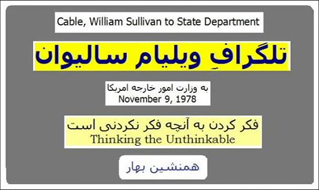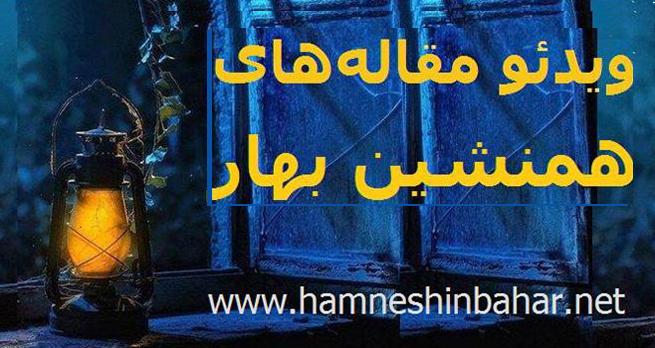فکر کردن به آنچه فکر نکردنی است تلگراف ویلیام سالیوان به وزارت امور خارجه
همنشین بهار
Thinking the Unthinkable

 خانمها و آقایان محترم، دوستان دانشور و دردمند، به شما سلام میکنم. این بحث به یکی از اسناد مهم مربوط به انقلاب بزرگ ضدسلطنتی که مُلاخور شد، میپردازد. تلگراف ویلیام سالیوان، آخرین سفیر ایالات متحده در ایران که ۹ نوامبر ۱۹۷۸ - و چنانچه گری سیک میگوید ۲ نوامبر آن سال - به واشنگتن (به وزارت امور خارجه) فرستاد. عنواش این بود: «فکر کردن بهآنچه فکر نکردنی است».
خانمها و آقایان محترم، دوستان دانشور و دردمند، به شما سلام میکنم. این بحث به یکی از اسناد مهم مربوط به انقلاب بزرگ ضدسلطنتی که مُلاخور شد، میپردازد. تلگراف ویلیام سالیوان، آخرین سفیر ایالات متحده در ایران که ۹ نوامبر ۱۹۷۸ - و چنانچه گری سیک میگوید ۲ نوامبر آن سال - به واشنگتن (به وزارت امور خارجه) فرستاد. عنواش این بود: «فکر کردن بهآنچه فکر نکردنی است». 
۱) ارتش و خمینی هر دو به شدت ضد کمونیسم و ضد شوروی هستند. این را علیرغم گزارشهای مبنی بر نفوذ کمونیسم در حلقه مشاوران خمینی میگویم.
۲) امیران جوانتر ارتش، بیشتر به غرب متمایلاند. تمامی نیروی هوایی، بیشتر ارتش و بسیاری از افسران نیروی دریایی در آمریکا آموزش دیدهاند. آن گروه از نیروی دریایی که در آمریکا آموزش ندیده هم، در انگلیس و ایتالیا دوره دیدهاند.
۳) برخلاف شِکوه و شکایت روحانیون که غرب نفت ایران را میدزدد، منطق حاکم بر اقتصاد ایران و روابطش با غرب نشانگر دوام اقتصاد ایران است.
۴) ارتش ایران باید بتواند یکپارچگیاش را حفظ کند تا از میان نرود. برای ارتش مفید خواهد بود اگر دین جایگاه خودش را حفظ کند. زیرا ابزار [دیگری] برای حفظ قانون و نظم برای یکپارچگی و دفاع از کشور ندارند.
۶) از صحبتهای قبل میتوان به این نتیجه رسید که چهرههای غیر کمونیست و میانهرو مانند [مهندس] بازرگان و [ناصر] میناچی باید به مقام و مسؤولیت برسند، آنان خواستار تشکیل مجلس مؤسسان برای تهیه قانون اساسی برای جمهوری اسلامی ایران میشوند و چنانچه در شرایط [سالم] که خشم و عصبانیت حاکم نیست، انتخابات برگزار شود، [آنوقت] چنین مجلسی باید متشکل از غیر کمونیستها، غیر متعصبها و میانهروهای متمایل به غرب باشد و آنان برای تدوین قانون اساسی مسؤولیت بپذیرند.
۷) گرچه پیشبینی نوع دولتی که ممکن است از انتخابات عمومی بعدی حاصل شود دشوار است،اما، دلایلی برای امید به حفظ جهتگیری بینالمللی ایران وجود دارد. جز این که روابط خود را با اسرائیل متوقف کند و جانب اعراب را بگیرد. [با فاصلهگیری از عربستان و تا حدّی از کویت؟]
۸) چنانچه آمریکا صمیمیت کمتری در مقایسه با شاه نشان دهد، چه بسا رضایتبخش باشد به ویژه اگر ارتش یکپارچگی خود را حفظ کند و از جایگاه خود به عنوان یکی از ارکان کشوربرخوردار باشد. [در وضع جدید] احتمالاً تعداد آمریکاییها [در ایران] کمتر خواهد بود.
۹) این...سناریو تحقق مییابد [فقط] در صورتی که هر گام درست برداشته شود. هر اقدام اشتباهی در هر جا میتواند آن را ویران کند و پیامدهای پیشبینی نشده داشته باشد. از این نظر نباید به راهکار سفارت دربارهٔ رویدادهای آینده بیتوجهی شود.
Cable, William Sullivan to State Department, "Thinking the Unthinkable," November 9, 1978
- With the incidence of Shi’i [2-3 words illegible] on Saturday, November 11, [word illegible] its [word illegible] Thursday-Friday weekend, Iran has entered on a long three-day holiday. Current indications are that it will be quiet but we shall have to test its temper as the days pass. Sunday, November 12, will be a critical day, because only then will we see whether the military government will be successful in getting this country back to productive work.
- In the meantime, it might be useful to engage in some fundamental examinations of the situation in Iran and the future of U.S-Iran relations. In doing this, it is probably healthy to examine some options which we have never before considered relevant.
- For foreigners, the general cliche about Iran has been that its society rested on two pillars -- the monarchy and the Shi'a religion. For the past fifteen years, the religious pillar has been very much subordinated and the tilt has been decidedly towards the monarchy. It is not necessary in this message to describe the way in which the religious pillar has been changed [or "seen a change"?] in the past ten months. However, it may be necessary to examine very closely the changes which have taken place in the monarchy pillar.
- First, the authority of the Shah has considerably shrunk. His support among the general public has become almost invisible these days. Portraits of the imperial family, which formerly adorned every shop widow, have nearly totally disappeared. Whether the views of the silent majority, the only tangible evidence of Iranian support for the monarchy comes from the armed forces. It has therefore become commonplace to refer to the monarchy as the "Shah -- supported by the military."
- However, even within that relationship, events of recent days may have produced a subtle change. It may be more correct at this time to speak of the monarchy pillar as being constituted essentially of the military - which (currently) supports the Shah. In consequence, the two elements that need our examination are the military and the religious.
- At the moment, these two elements are ostensibly in confrontation. The religious have called for the equivalent of Satyagraha -- passive resistance with strikes in strategic areas of the economy. The oil production facilities, Iran Air and the telecommunications system seem to be the prime targets of their attention. If the military can get these areas of the economy back in full production peaceably, they will probably be able to prevail over the religious, but the relationship [2 Y2lines illegible].
- On the other hand, if the military are to restore production and to break: the tide of passive resistance, they will reach the point of making a fateful decision -- either to enforce production by a bloodbath or to reach an accommodation with the religious. Since the latter are dominated by Ayatollah Khomeini, it must be assumed that a precondition for an accommodation would be the acceptance of his insistence that the shah must leave and the monarchy be dis-established in favor of an Islamic Republic.
- It is rather difficult to imagine a man like Prime Minister General Azhari willingly plunging his country into a blood bath. It is equally difficult to imagine him, or most military officers of his vintage, inciting the Shah to abdicate. However, if the Shah and the military both shy away from the bloodbath, it may eventuate that both the Shah and the more senior military would abdicate, leaving the armed forces under the leadership of younger officers who would be prepared to reach an accommodation with the religious.
- If such a turn of events should transpire, it would be important for the U.S. to have done a careful evaluation of its consequences for our position and that of our allies with respect to Iran. The following considerations are relevant:
(1) Both the Iranian Armed Forces and the Khomeini Muslims are strongly anticommunist and anti-Soviet. We say this despite reports of alleged communist infiltration of Khomeini’s circle of advisors.
(2) The younger military officers have a genuine pro-West orientation. All Air Force, most Army, and many Navy officers have been trained in the U.S. Those Navy not trained in U.S. have been trained in U.K. and Italy.
(3) Despite religious complaints that the West is "stealing" Iranian oil, logic of Iran’s economic ties with West would have to assert itself in any realistic appraisal of Iran’s economic survival.
(4) Iranian military ought to be able to preserve its integrity and not RPT not evaporate. Religious would find it useful for military to remain intact, because they have no RPT no Islamic instruments for maintaining law and order or the integrity and defense of the nation.
(5) As consequence of any military-mullah accommodation, Khomeini could be expected retract [sic: return to?] Iran in triumph and [2 words illegible] like position in the political constellation [?]. He has said that at such time, he would reveal the name of his candidate for political leadership. However, it would presumably have to be someone acceptable to the military rather than a Nasser-Gadhafi type that might be the Ayatollah's preferred candidate.
(6) If, as result of foregoing considerations, non-communist, moderate political figures like Bazargan and Minatchi should emerge in positions of responsibility, they would call for elections to a constituent assembly to draw up a constitution for an Islamic Republic of Iran. If elections are held in any atmosphere other than one of frenzy, such assembly ought to contain a strong percent of non-communists, non-Islamic-fanatics, and pro- western moderates who would have considerable influence in developing a responsible constitutional document.
(7) While it is difficult to predict the sort of government which might [emerge] from subsequent general elections, there would be reasons to hope that it would maintain Iran's general international orientation except that it would cease its ties with Israel and associate itself with the Arabs, probably [sic] closer to the Rejectionist Front than to Saudi Arabia. It would probably be a Kuwait writ large in its general orientation.
(8) Although U.S. involvement would be less intimate than with the Shah, it could be an essentially satisfactory one, particularly if the military preserves both its integrity and its status as one of the "pillars" of the nation. There would presumably be fewer Americans [2 lines illegible].
(9) [Word illegible] this rather [word illegible] scenario could come about only if every step along the way turned out well. Any single misstep anywhere could destroy it and lead to unpredictable consequences. Therefore, it should not RPT not be interpreted as this Embassy's prediction of future events.
(10) Our current [word illegible] of trusting that the Shah, together with the military, will be able to face down the Khomeini threat is obviously the only safe course to pursue at this juncture. However, if it should fail and if the Shah should abdicate, we need to think the unthinkable at this time in order to give our thoughts some precision should the unthinkable contingency arise.
Sullivan
در همین رابطه

منبع:پژواک ایران
